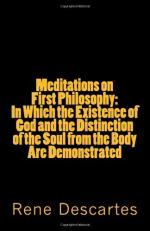Sect. LXVIII. Will may Resist Grace, and Its Liberty is the Foundation of Merit and Demerit.
When therefore I say I am free, I mean that my will is fully in my power, and that even God Himself leaves me at liberty to turn it which way I please, that I am not determined as other beings, and that I determine myself. I conceive that if that First Being prevents me, to inspire me with a good-will, it is still in my power to reject His actual inspiration, how strong soever it may be, to frustrate its effect, and to refuse my assent to it. I conceive likewise that when I reject His inspiration for the good, I have the true and actual power not to reject it; just as I have the actual and immediate power to rise when I remain sitting, and to shut my eyes when I have them open. Objects may indeed solicit me by all their allurements and agreeableness to will or desire them. The reasons for willing may present themselves to me with all their most lively and affecting attendants, and the Supreme Being may also attract me by His most persuasive inspirations. But yet for all this actual attraction of objects, cogency of reasons, and even inspiration of a Superior Being, I still remain master of my will, and am free either to will or not to will.
It is this exemption not only from all manner of constraint or compulsion but also from all necessity and this command over my own actions that render me inexcusable when I will evil, and praiseworthy when I will good; in this lies merit and demerit, praise and blame; it is this that makes either punishment or reward just; it is upon this consideration that men exhort, rebuke, threaten, and promise. This is the foundation of all policy, instruction, and rules of morality. The upshot of the merit and demerit of human actions rests upon this basis, that nothing is so much in the power of our will as our will itself, and that we have this free-will—this, as it were, two-edged faculty—and this elative power between two counsels which are immediately, as it were, within our reach. It is what shepherds and husbandmen sing in the fields, what merchants and artificers suppose in their traffic, what actors represent in public shows, what magistrates believe in their councils, what doctors teach in their schools; it is that, in short, which no man of sense can seriously call in question. That truth imprinted in the bottom of our hearts, is supposed in the practice, even by those philosophers who would endeavour to shake it by their empty speculations. The intimate evidence of that truth is like that of the first principles, which want no proof, and which serve themselves as proofs to other truths that are not so clear and self-evident. But how could the First Being make a creature who is himself the umpire of his own actions?
Sect. LXIX. A Character of the Deity, both in the Dependence and Independence of Man.




